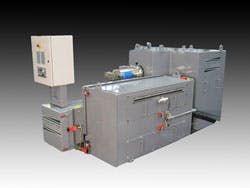Leaping into Global Markets
Exporting offers a huge upside potential, but many small companies still find that many challenges arise when they first stretch beyond national borders. When PCT Engineered Systems redesigned a product and targeted Europe, technical issues, certification and cultural understanding were among the challenges that arose.
During its first 20 years, PCT rarely sold outside the U.S. But an acquisition in 2003 set the stage for an expansion that began last year. That’s when PCT completed a targeted redesign of the system it acquired and improved substantially its competitiveness in the printing press market.
That product, BroadBeam, uses electron beam curing to dry inks much faster than conventional gas-fired drying ovens. The system also significantly reduces energy consumption, eliminating the heating expense and pollution of gas ovens.
Another benefit of the redesign is a reduction in floor space requirements. The BroadBeam system is only 7 feet long, far shorter than the 20- to 100-foot systems that use large fans to blow hot air over the printed material. Though it’s smaller, the BroadBeam system still allows lines to run in excess of 1,000 feet per minute.
The new system is used primarily in producing food packaging, particularly for paperboard cartons that contain milk or juice. The system is also used to cure ink on flexible packaging materials such as bags. A majority of the companies that make the printing presses for this market are headquartered in Europe, while their customers are scattered around the globe. Both can add the BroadBeam technology to their equipment, so PCT has a huge overseas market potential.
“Our little company in Iowa is now knocking on doors all around the world," says Karl Swanson, sales and marketing manager at PCT. While Europe is a central focus, he notes that the company’s marketing efforts are truly global, since food packaging is produced everywhere.
The system provider based in Davenport, Iowa, discovered many new issues when it started augmenting its domestic marketing efforts. They had to use technology that is popular in each region so it would be simpler for customers to integrate the curing system.
One technology that helps greatly in Europe is Profibus. The field bus is a standard on BroadBeam systems, which helps it mesh easily with the many European systems that use the well-known standard. That connectivity makes it simpler to integrate the curing system with the rest of the line.
PCT is also adopting control technologies that are popular in Europe and other targeted regions. “Our products have to be compatible globally, meshing with controls that are being installed on the printing presses," Swanson says.
Often, that means adopting programmable logic controllers made by Siemens Industry. Partnering with Siemens provides global compatibility while also making it simpler for PCT to leverage the global reach of a well-established company that has personnel in more than 190 countries.
When PCT is developing versions for certain countries, they often seek advice from Siemens’ support staff. “They help us make sure we get the right model numbers for different products, making sure we properly address the local requirements for the country,” says Pat Ward, BroadBeam product manager at PCT Engineered Systems. ”We need to be sure that the component ratings are suitable for our customer’s location.”
Using devices that have already been proven makes the certification process much simpler. When PCT is assembling their CE mark certification file, they can simply check off the elements that they know meet compliance requirements. “The more components that have already been identified as meeting requirements, the easier it is to go through the certification process,” Ward says.
Though these technical questions are an important issue for PCT, they aren’t an enormous challenge for the Siemens technical staff. That’s partially because the BroadBeam system doesn’t require a complex control system.
“Our application is pretty basic for Siemens. It’s basically a PLC running analog and digital I/O,” Ward says. He noted one of the benefits of using basic PLCs and other common components is that spare parts are readily available.
Another benefit of having a large partner with global offices is the availability of replacement parts. When a system stops working, PCT sometimes sends its technicians out to the site to make repairs. Other times, technicians in Iowa can use Internet links to diagnose problems, then tell their customers which parts need to be replaced.
Either way, it’s always helpful to know that shutdowns won’t be extended because spares weren’t readily available. “The fact that we’ve got a strong partner means that we can get parts anywhere in the world," Ward says.
Technical issues are important, but many other issues arise when marketers travel to new countries. Swanson also turns to his larger partner when it’s time to get a bit of help with local customs. Siemens staffers can help explain some of the differences in their region.
“The more business we do abroad, the more we realize how critical the cultural differences are,” Swanson says. “The way people interpret a comment in Greece, Australia or China are very different.”
PCT is expanding its reach by teaming up with additional marketing and sales personnel who know the markets and the regions. Having this local presence is a necessity to establish a presence and help build confidence in the brand name, Swanson says.“Initially, we identified sales reps that could work with us, some were reps of companies that make equipment our systems are used with. Then other reps came to us when we exhibited at focused trade shows," he explains.
PCT has seen solid success in global markets and has plans to expand its international sales. One key in its efforts will be to continue working closely with companies like Siemens that can provide support as well as technology.

